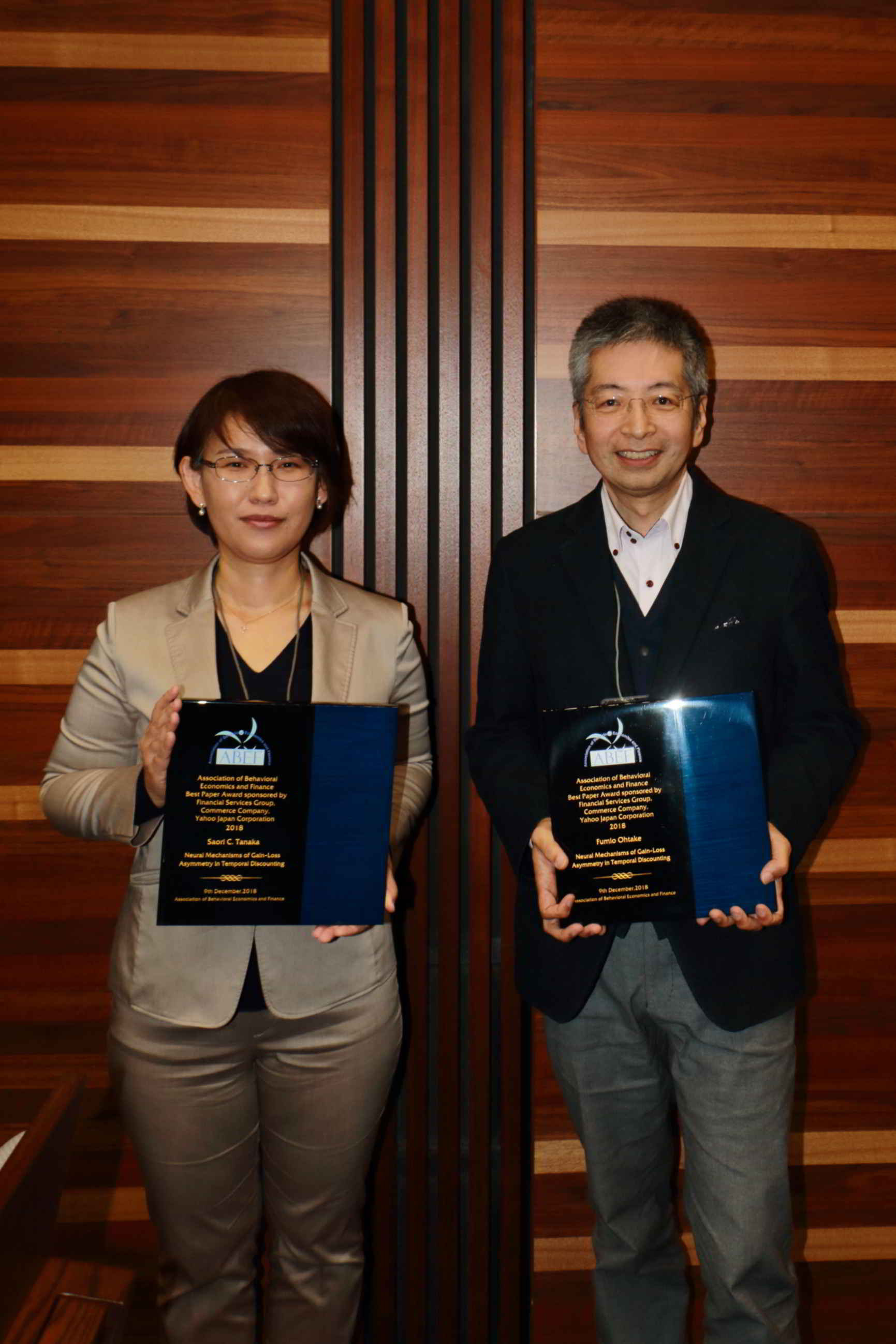Association of Behavioral Economics and Finance Best Paper Award sponsored by Financial Services Group, Yahoo Japan Corporation
ABEF launched ABEF Best Paper Prize (ABEF Yahoo Award) in 2018, to promote international studies in behavioral economics and related areas. This prize is funded by Financial Services Group, Yahoo Japan Corporation.
Target of papers to be awarded
Academic papers published in international journals in recent five years
Selection process
After deliberations by the Selection Committee, the paper to be awarded the prize will be decided by a vote of the overseas members of the Selection Committee.
Frequency
Annually
Prize
300,000 yen, award plaque, and award certificate
Award ceremony
The winners are celebrated during the general meeting of the members at the annual conference.
2020 Prize
The 3rd ABEF Best Paper Prize was awarded to the following paper:”Rawlsian maximin rule operates as a common cognitive anchor in distributive justice and risky decisions” by Tatsuya Kameda, Keigo Inukai, Satomi Higuchi, Akitoshi Ogawa, Hackjin Kim, Tetsuya Matsuda, and Masamich Sakagami (2016), Proceedings of National Academy of Sciences of the United States of America, vol. 113, no. 42, 1817–1822.
Prize winners: Tatsuya Kameda (University of Tokyo), Keigo Inukai (Meiji-gakuin University), Masatoshi Ogawa (Juntendo University) and Masamichi Sakagami (Tamagawa University)
Comment by the committee:
This paper investigates the relation between maximin preferences for single-agent risk-taking decisions and maximin preferences for distributing payoffs to others. By exploiting Mouse-tracking and fMRI, the authors find that the subjects activate the same parts of the brain in terms of the worst possible payoff. It is highly appreciated to provide evidence that the distribution for others is psychologically and cognitively linked to the risk-taking decision for self.
The 4th ABEF Best Paper Prize Committee Members:
Takeshi Murooka (Committee Chair: Osaka University)
Takanori Ida (Vice-Committee Chair: Kyoto University)
Colin F. Camerer (California Institute of Technology)
Masao Ogaki (Keio University)
Fumio Otake (Osaka University)
Katsuhiko Okada (Kansai Gakuin University)
George F. Loewenstein (Carnegie Mellon University)
Laura Schechter (University of Wisconsin-Madison)
2019 Prize
The 2nd ABEF Best Paper Prize was awarded to the following two papers with the highest voting scores from the overseas members (in the order of publication years)
Peize winning paper: “Inferior Products and Profitable Deception,” by Paul Heidhues, Botond Kőszegi, and Takeshi Murooka (2017), The Review of Economic Studies 84 (1), 323–356.
Prize winners: Takeshi Murooka(Osaka University)
Comment by the committee:
This paper is a big picture study that theoretically examines whether firms that set additional prices that naïve consumers would ignore can survive in a competitive retail market. Competition does not necessarily mean that deception or low quality products drive them away from competitive markets. Rather, it showed the exact opposite by assuming the existence of a naïve consumer. It is highly regarded for its theoretical structure and its rich implications for future empirical research, including field intervention experiments between consumers and producers.
Peize winning paper: “Moral Suasion and Economic Incentives: Field Experimental Evidence from Energy Demand” by Koichiro Ito, Takanori Ida, Makoto Tanaka (2018), American Economic Journal: Economic Policy, 10(1): 240-267.
Prize winners: Koichiro Ito, Takanori Ida, Makoto Tanaka
Comment by the committee:
This paper compares the relative effectiveness of dynamic pricing, a traditional economic method, and moral persuasion, a behavioral economic method, as methods to encourage energy conservation during peak-demand hours. The results showed that monetary incentives with dynamic pricing were more effective and sustained over time, and moral persuasion was less effective over time. It was evaluated as a very important and elegant paper with an excellent big picture view. In particular, no other study has compared the relative effectiveness of behavioral and traditional economics methods and measured their long-term effects.
The 2nd ABEF Best Paper Prize Committee Members:
Fumio Otake (Committee Chair: Osaka University)
Dirk Engelmann (Humboldt-University Berlin)
Paul J. Ferraro (Johns Hopkins University)
Takahiro Hoshino (Keio University)
George F. Loewenstein (Carnegie Mellon University)
Katsuhiko Okada (Kansai Gakuin University)
Masao Ogaki (Keio University)
Kan Takeuchi (Hitotsubashi University)
2018 Prize
The 1st ABEF Best Paper Prize was awarded to the following paper:”Neural Mechanisms of Gain-Loss Asymmetry in Temporal Discounting” by Saori C. Tanaka, Katsunori Yamada, Hiroyasu Yoneda, and Fumio Ohtake (2014), Jouranal of Neuroscience, 34(16): 5595-5602.
Prize winners: Fumio Otake (Osaka University) and Saori Tanaka (Advanced Telecommunications Research Institute International, INC.)
Comment by the committee:
This paper compared brain activity of participants who exhibited the sign effect in intertemporal choice tasks and those who did not. The authors found significant differences in the two participant groups in striatal and insular activities. The sign effect has been found to be associated with social problems such as obesity and incurring multiple debts in other studies. This paper’s findings contribute to our understanding of the neural basis of this important effect
The 1st ABEF Best Paper Prize Committee Members:
Masao Ogaki (Committee Chair: Keio University)
Jan Engelmann (University of Amsterdam)
Takahiro Hoshino (Keio University)
Takanori Ida (Kyoto University)
Alexander K. Koch (Aarhus University)
Axel Ockenfels (University of Cologne)
Katsuhiko Okada (Kansai Gakuin University)
Kan Takeuchi (Hitotsubashi University)

